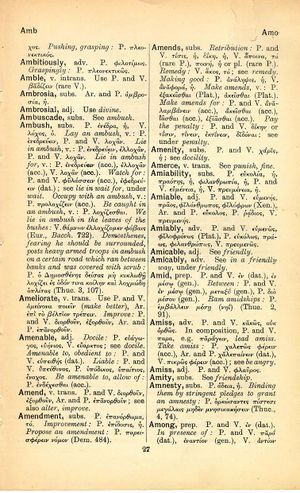amiss: Difference between revisions
From LSJ
Τῶν δυστυχούντων εὐτυχὴς οὐδεὶς φίλος → Felix amicus nullus infelicibus → für die im Unglück ist kein Glücklicher ein Freund
(CSV3) |
m (Woodhouse1 replacement) |
||
| Line 1: | Line 1: | ||
{{Woodhouse1 | {{Woodhouse1 | ||
|Text=[[File:woodhouse_27.jpg|thumb|link={{filepath:woodhouse_27.jpg}}]] | |Text=[[File:woodhouse_27.jpg|thumb|link={{filepath:woodhouse_27.jpg}}]] | ||
===adverb=== | |||
P. and V. κακῶς, οὐκ ὀρθῶς. | [[prose|P.]] and [[verse|V.]] [[κακῶς]], [[οὐκ ὀρθῶς]]. [[in composition]], [[prose|P.]] and [[verse|V.]] [[παρα]], e. g. [[παράγειν]], [[lead amiss]]. | ||
[[take amiss]]: [[prose|P.]] [[χαλεπῶς φέρω]], [[χαλεπῶς φέρειν]] (acc.), [[Aristophanes|Ar.]] and [[prose|P.]] [[χαλεπαίνειν]] (dat.),. [[verse|V.]] [[πικρῶς φέρω]], [[πικρῶς φέρειν]] (acc.); see [[be angry]]. | |||
===adjective=== | |||
P. and V. [[φλαῦρος]]. | [[prose|P.]] and [[verse|V.]] [[φλαῦρος]]. | ||
}} | }} | ||
Revision as of 08:54, 20 May 2020
English > Greek (Woodhouse)
adverb
P. and V. κακῶς, οὐκ ὀρθῶς. in composition, P. and V. παρα, e. g. παράγειν, lead amiss.
take amiss: P. χαλεπῶς φέρω, χαλεπῶς φέρειν (acc.), Ar. and P. χαλεπαίνειν (dat.),. V. πικρῶς φέρω, πικρῶς φέρειν (acc.); see be angry.

